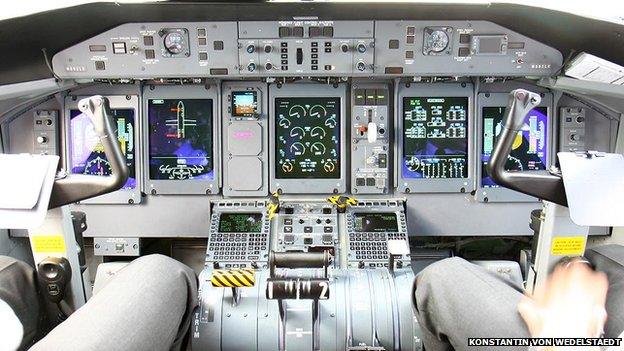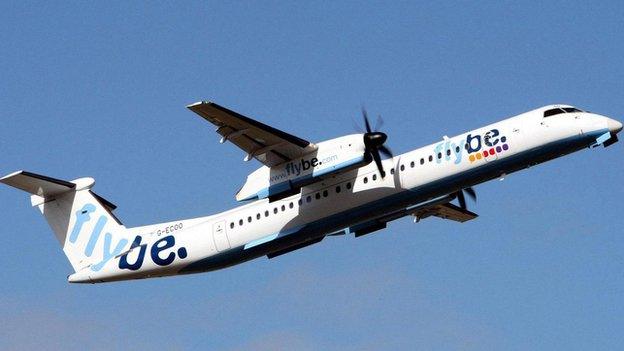Pilot's artificial arm 'became detached while landing plane'
- Published

The pilot was sitting on the left of the Dash 8 cockpit when his artificial left arm detached from the controls
A pilot lost control of a passenger plane after his artificial arm became detached as he was coming in to land, an accident report has said.
The Flybe flight from Birmingham, with 47 passengers on board, was approaching Belfast City Airport in gusty conditions on 12 February.
It landed heavily but no-one was hurt and the plane was not damaged.
The pilot said he would be more cautious in future about checking his attachment, according to the report.
In a statement, Flybe said the senior captain was one of its "most experienced and trusted pilots", and the safety of passengers and crew had not been compromised in any way.
Flybe said the senior captain was one of its most experienced and trusted pilots
Shortly before beginning to land the Dash 8 aircraft, the 46-year-old had checked that his prosthetic lower left arm was securely attached to the clamp that he used to fly the aircraft, with the latching device in place.
The Air Accidents Investigation Branch (AAIB) report said the captain had disconnected the autopilot and was manually flying the aircraft.
However, as he made the flare manoeuvre - a stage of the landing shortly before touchdown - "his prosthetic limb became detached from the yoke clamp, depriving him of control of the aircraft".
Pilot Steven Robinson: "I do it one-handed"
While he had thought about getting his co-pilot to take control, the time available and the challenging conditions meant his best course of action was to move his right hand from the power levers on to the yoke to regain control.
"He did this, but with power still applied and possibly a gust affecting the aircraft, a normal touchdown was followed by a bounce, from which the aircraft landed heavily," the report found.
The AAIB reported that the captain had said that in future he would be more cautious about checking the attachment on his prosthesis as he may have dislodged the latching mechanism.
He also said he would brief his co-pilots about the possibility of a similar event and that they should be ready to take control at any time.
'Safety checks'
Captain Ian Baston, Flybe's director of flight operations and safety, said it was an equal opportunities employer and "in common with most airlines, means we do employ staff with reduced physical abilities".
"The safety of our passengers and crew is our number one priority," he said.
"This means that Flybe not only adheres to the Civil Aviation Authority's strict requirements relating to the employment of staff with a reduced physical ability, but exceeds them to ensure that safety is never compromised.
He said an internal investigation following the incident had "determined a series of additional failsafe safety checks" that had been implemented "immediately to ensure that this type of incident could not happen again".
- Published14 August 2014
